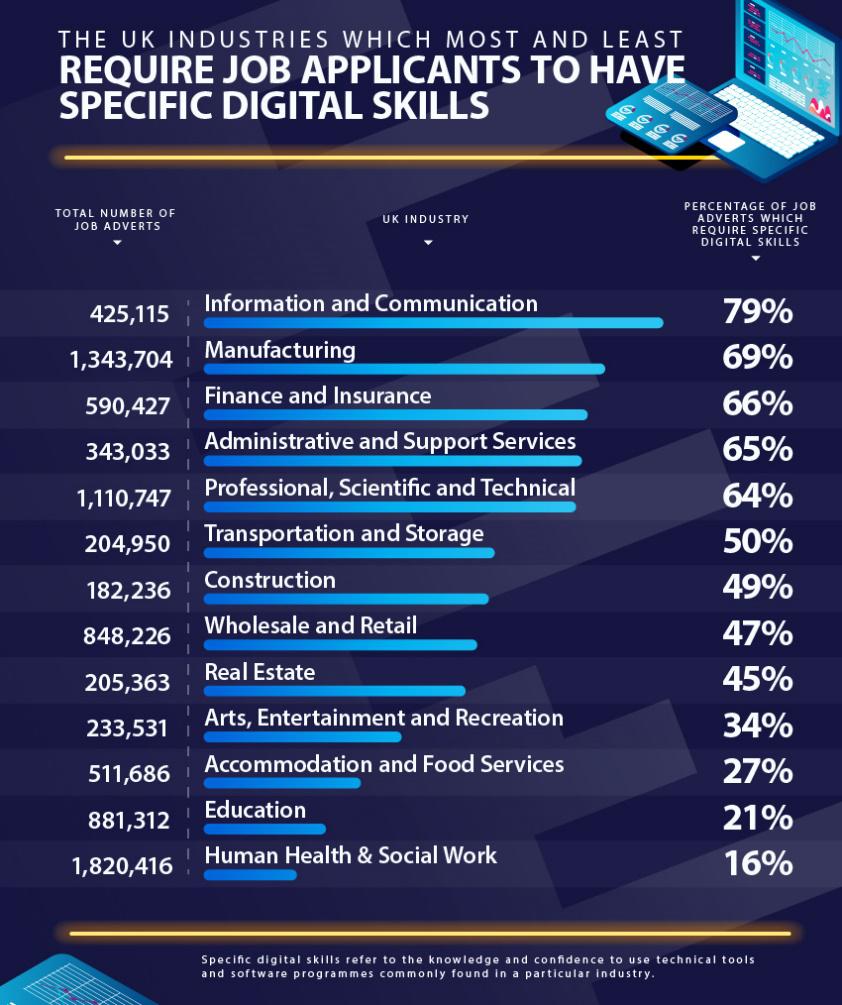
Digital skills are very necessary in this world, especially when it comes to working in some sectors. Finance and insurance are going through massive digitisation processes, fostered by the advent of emerging technologies and a continuous change in customer habits. That is why 66% of vacancies in FinTech jobs and also in the InsurTech sector need candidates to have certain digital skills.
For many, the start of a new year is the perfect incentive to make important changes to their life. One aspect a lot of Brits will tend to focus on is their job – as they look to move to another company or even pursue an entirely new career path.
In fact, recent research by workplace accreditation body Investors in People found that 24% of Brits will actively seek a new role this year and despite some uncertainty caused by Brexit, Finance and Insurance are still thriving industries in the UK.
Interested in the employment market, The Knowledge Academy analysed the latest findings from Gov.uk, who analysed over 8 million job adverts, to discover the UK industries that most and least require job applicants to have specific digital skills. These include the knowledge and confidence to use technical tools and software programmes in a particular industry as well as possessing any other key/relevant digital credentials.

The Knowledge Academy found that jobs in information and communications (79%) most require candidates to have specific digital skills.
Thereafter, 69% of roles in manufacturing desire specific digital competencies from prospective applicants.
Slightly below, 66% of openings in the finance and insurance sector need job hopefuls to have certain digital skills.
On the other end, positions in human health and social work (16%) least require candidates to have definitive digital proficiencies.
Slightly above, only 21% of roles in education need applicants to have specific digital capabilities.
Additionally, The Knowledge Academy surveyed 562 UK employees (who plan to change their job this year) to find out the mains barriers preventing them from developing their existing digital skills as well as learning new digital skills to significantly boost their career prospects.
From this, The Knowledge Academy found that a ‘lack of time (72%)’ is preventing a majority of employees from learning/developing valuable digital skills.
The other stumbling blocks stated by respondents include: ‘Not knowing where to start’ (67%), ‘feeling too lazy/tired’ (64%), ‘fear of failing’ (59%), ‘believing learning resources/courses will be too expensive’ (51%), ‘believing relevant learning resources/courses will be too hard to find’ (45%) and ‘feeling too old to learn new skills/digital skills’ (23%).
Tips to learn digital competencies
The Knowledge Academy’s top three tips for individuals wanting to learn/improve their digital competencies:
Assess the Job Market
Look at the required digital skills on the job specification of the roles you are interested in and then list them – this provides a focused approach towards what you should be aiming to learn.
Resources for Desired Digital Skills
Search for courses/podcasts/videos/websites/books which provide detailed and concise information/guidance/learning materials/interactive exercises on desired digital skills.
Schedule Time for Revision/Practice
Once you have identified key learning resources, schedule time for revision/practice – don’t be too ambitious with hours and try choosing days where you are more likely to be relaxed (i.e. weekends).
HedgeThink.com is the fund industry’s leading news, research and analysis source for individual and institutional accredited investors and professionals





































